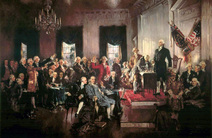Arendt (1906-1975) was trained in Europe before World War II, working with the likes of Karl Jaspers, Martin Heidegger and Walter Benjamin. She fled Germany to France in 1933: the Germans wouldn’t let her teach in their universities because she was a Jew. When the Nazis took over France in 1939, she was interned in a camp and labeled an enemy alien; soon after she escaped, making her way to the United States and New York City in 1941. Arendt became an American citizen in 1950.
The tag of constitutionalist is from Arendt’s chapter four in On Revolution (1963), “Foundation I, Constitutio Libertatis” – meaning orders (regulations) and legal status.
The Latin phrase jumped out at me; at first I thought she might be saying something negative … then I read a bit of the chapter: one page really, page 142. Arendt notes the stages of rebellion and revolution are different by contrasting the historian to the political scientist; she argues the historian looks at “the violent stage of rebellion” while the political scientist looks to “the quieter stage of revolution and constitution.”
That caught my attention: she’s saying revolution by constitution is quiet. I had to read it again – here it is:
“If, however, one keeps in mind that the end of rebellion is liberation, while the end of revolution is the foundation of freedom, the political scientist will at least know how to avoid the pitfall of the historian who tends to place his emphasis upon the first and violent stage of the rebellion and liberation, on the uprising against tyranny, to the detriment of the quieter second stage of revolution and constitution, because all the dramatic aspects of his story seem to be contained in the first stage and, perhaps, also because the turmoil of liberation has so frequently defeated the revolution.”
Arendt argues the French Revolution (1789-99) failed because it lost its way; the American Revolution (1776-83), with its “fever of constitution-making,” highlights her idea of success:
“This temptation, which befalls the historian because he is a storyteller, is closely connected to the much more harmful theory that the constitutions and fever of constitution-making, far from expressing truly the revolutionary spirit of the country, were in fact due to forces of reaction and either defeated the revolution or prevented its full development, so that – logically enough – the Constitution of the United States, the true culmination of this revolutionary process, is understood as the actual result of counter-revolution.”
Arendt refers to the US Constitution as, “the true culmination of this revolutionary process.” She is not running for office – she’s theorizing:
“The basic misunderstanding lies in the failure to distinguish between liberation and freedom; there is nothing more futile than rebellion and liberation unless they are followed by the constitution of the newly won freedom.”
Constitution again … then Arendt finishes the paragraph by quoting a founder:
“For ‘neither morals, nor riches, nor discipline of armies, nor all these together will do without a constitution’ (John Adams).”
Arendt’s On Revolution was published in 1963, the year of President Kennedy’s assassination (a moment of violence); she wrote of his death for the New York Review of Books that December: The Fate of the Union: Kennedy and After.
Arendt was born into a monarchy, fled fascism, wrote of quiet revolution by constitution, and then lived through America’s turbulent 1960s. It’s no wonder Arendt was fond of America’s revolutionaries, men like George Washington and John Adams. She knew their faults. She also knew they understood Constitutio Libertatis and lived it – just like Hannah Arendt did.
Happy Presidents Day America ~ And Happy Birthday George!
Bryan W. Brickner

 RSS Feed
RSS Feed
